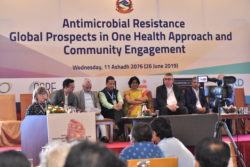Outputs and Impacts: CARAN
Findings
CARAN has allowed us to understand the lived experiences of our focal communities in relation to AMR. Films have been used to facilitate discussion on this topic with the Ministry for Health and Population at an international conference in June this year. The Ministry have since invited our Nepali team to support the development of the country’s antimicrobial resistance (AMR) action plan and to support and advise on other AMR-related policies.

The communities who produced the films attended the June event and were able to vocalise the impact of the film-making process on their lives, describing not just an increase in awareness and knowledge of antibiotics but an increase in confidence and their personal ability to make a difference on major issues. We are particularly pleased by this finding as it supports existing evidence that participatory film-making can develop ‘soft skills’ including confidence and communication.
Outputs & Impacts
The project resulted in the development of 6 participatory films communicating lived experiences around the challenge of drug resistance within the Kathmandu valley.
A project manual has now been produced and is available free of charge. We hope this output will increase the reach of participatory film making as an advocacy tool and method for engaging communities with One Health challenges.
Academic outputs include the project's first peer reviewed publication which discusses the value of participatory film-making to tackle AMR. Several others are to follow which will explain and evaluate the CARAN project, and guide other research teams to attempt similarly creative and interdisciplinary approaches to tackling major challenges.
